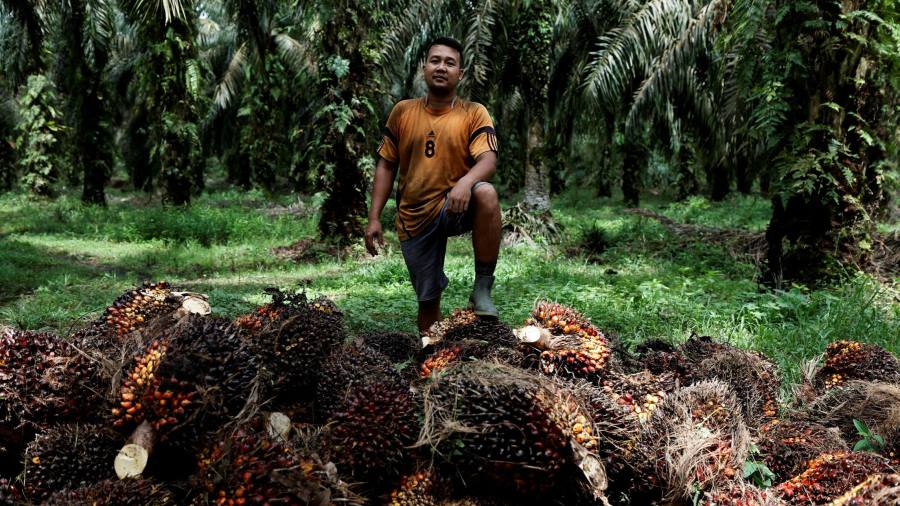
Indonesia and Malaysia have said they will delay trade talks with the EU while they seek fairer treatment for small palm oil producers hit by the bloc’s “punitive” new rules to prevent deforestation.
Dato’ Sri Haji Fadillah bin Haji Yusof, deputy prime minister of Malaysia, told the Financial Times during a visit to Brussels on Wednesday that the EU’s recently adopted law banning the import of products that come from land cleared of forests, was “punitive and unfair treatment towards us and to smallholders in particular”.
His counterpart H.E. Airlangga Hartarto, the Indonesian minister for economic affairs, said that the policy favoured “large corporations or multinationals” that could afford the level of bureaucracy that the regulation will demand.
Indonesia, which has been negotiating with the EU over a free trade agreement for seven years, said it would not progress those talks until more leniency was given to palm oil producers under the new EU rules. “We can wait an additional seven years,” Hartarto added.
Yusof similarly said that overtures from EU officials to progress talks on a trade deal with Malaysia would depend on what action the EU took to improve the treatment of its smallholders.
The intervention by the two ministers is the latest in a series of trade spats between the south-east Asian countries and the EU. Both sides have open disputes with the other under review by the World Trade Organization.
The deforestation law, agreed by the EU lawmakers in December, bans cattle, cocoa, coffee, palm oil, soya, wood and rubber products from being sold in the bloc unless they are certified as coming from sustainably managed land with countries labelled as low, standard or high risk.
The rating system and technology used to monitor deforestation remains unconfirmed but the rules are expected to come into force next year prompting concern from exporting countries that they will have little time to adapt.
According to Indonesian officials, palm oil importers estimate that after the law is implemented one 20 foot container of palm oil could require 1.2mn documents once sanitary requirements, customs declarations and sustainability certification are accounted for.
The two countries also fear that if they are deemed “high risk” other trading partners could be put off. “Labelling . . . has consequences to the sovereignty and image of the country,” the pair said in a statement.
Indonesia and Malaysia account for 83 per cent of the world’s palm oil production, according to the US Department of Agriculture. The EU is their third-largest market, although the bloc’s consumption of palm oil is declining, with imports expected to half between now and 2032.
Environmental groups say there has been a marked decline in deforestation for palm oil in Asia, especially in Indonesia, which is south-east Asia’s biggest economy and one of the world’s largest carbon emitters.
Deforestation for oil palm cultivation in Indonesia, Malaysia and Papua New Guinea dropped in 2021 to its lowest level since 2017, according to data by Chain Reaction Research, a Washington-based think-tank.
But despite efforts to counter deforestation, Mighty Earth and other environmental campaigners say that large, forest-clearing fires are still destroying irreplaceable biodiversity and contributing to climate change.
Indonesia and Malaysia have established their own certificates for sustainable palm oil and are pushing the EU to accept those when it implements the deforestation law. But EU officials say that this will only be considered alongside satellite technology that can monitor where deforestation is happening.
Hartarto warned that the bloc risked losing partners if its climate laws resulted in “so many barriers on trade”.
Heidi Hautala, a member of the European parliament who met with the delegation, said that she was hopeful the EU could “change this narrative about European regulatory imperialism to something that is more productive”.
The EU said: “Measures such as the deforestation regulation are climate-oriented, environmental policy tools, and will be applied also to domestic producers. Therefore, they will be implemented in an even-handed manner that does not constitute arbitrary or unjustifiable discrimination for third country producers, or a disguised restriction to trade. They were designed to be fully compatible with World Trade Organization rules.”
It added: “The EU will step up its engagement, both bilaterally with producer and consumer countries and in relevant multilateral forums, to assist producer countries to ensure the new provisions are effectively implemented.”
A delegations of EU officials will travel to Indonesia next month.
Joseph D’Cruz, chief executive of Roundtable on Sustainable Palm Oil, said the EU, Indonesia and Malaysia needed to work with the industry to ensure it could “demonstrate sustainable production” in line with the EU law, while also supporting the “economic needs and aspirations” of farming communities.